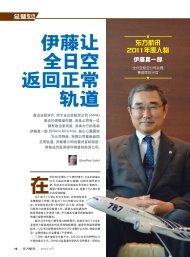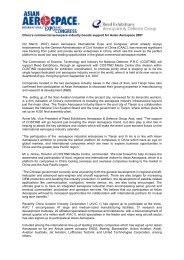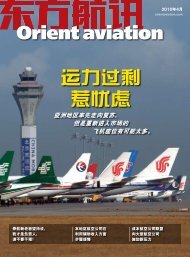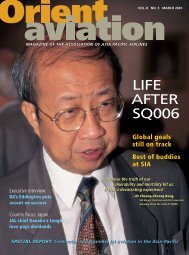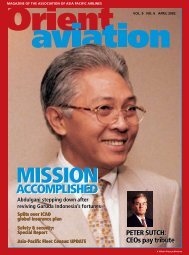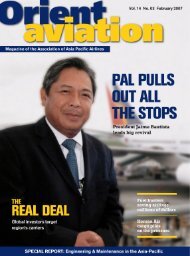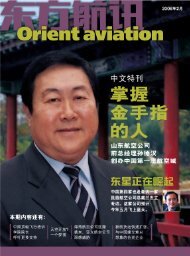China's - Orient Aviation
China's - Orient Aviation
China's - Orient Aviation
- No tags were found...
You also want an ePaper? Increase the reach of your titles
YUMPU automatically turns print PDFs into web optimized ePapers that Google loves.
start next yearcarbon offset programmefuel solutions (bio-jet fuels) that differ fromtraditional bio-fuel development. Biojetfuels can potentially be blended withtraditional kerosene fuel (Jet-A) to reducedependency on petroleum-based fuels.Next year’s flight will use a bio-jet fuelblended with kerosene. An announcementon the source and mix will be made closerto the time of the flight.The B747 being used for the flight willbe powered by four Rolls-Royce RB211-524s engines. Only one engine will use thederived fuel, with the remaining enginesdriven by kerosene.Jim Sheard, senior vice-presidentairlines for Rolls-Royce, said: “We havebeen investing in research devoted toenvironmental improvement for many years.As an industry, we’ve already succeededin driving down fuel burn by 70% on apassenger per kilometre basis since thedawn of the jet age.”Under the new carbon offset programme,passengers of Qantas and its low-costsubsidiary Jetstar can elect to offset theirshare of flight emissions by making a smallcontribution that will go towards approvedabatement programmes, which may includeenergy efficiency measures, generationof renewable energy and tree plantingprojects.“We have undertaken a full life cycleassessment of all operations, calculatingthe emissions associated with carrying apassenger from one point to another. Anonline calculator assesses data about theflight sector and automatically advisescustomers of their emissions and the cost ofoffsetting them,” said Qantas chief executive,Geoff Dixon.‘Another step in our plan tolead the globe in developmentof the most environmentallyresponsible airline’Rob FyfeChief ExecutiveAir New ZealandThe airline has also committed tooffsetting emissions for all staff travellingon business as well as those generated by thegroup’s ground transport vehicles.Dixon said Qantas was focused onachieving a carbon dioxide savings target ofmore than two million tonnes by June 2011through a range of initiatives.on emissions tradingabdicating the leadership role given to it inthe Kyoto agreement on cutting greenhousegas emissions.Critics, including the U.S. and China, aswell as groups such as the AAPA and IATA,remain incensed at the European action.They believe Europe has no right toforce airlines using European air spaceto participate in that region’s emissionscaps programme. They prefer a voluntaryagreement among nations.W h ile t he ICAO assembly – t heorganization is a division of the UnitedNations – did set up a new group composedof senior government officials to work onformulating an aggressive action plan onaviation and climate change, it failed to reachany consensus on the controversial issue ofemissions trading schemes.It issued a statement saying it recognisedthe potent ial benef its ofemissions trading, but decidedthe inclusion of internationalaviation in such schemesshould be subject to “mutualag r e e ment a mongst t herespective governments”. Eventhat turned out to be far fromunanimous.The organization’s Europeanmembers all reserved theirposition and the EU reiterated itintended to include internationalairlines within the EU emissionst rading scheme, wit h orwithout the consent of non-EUgovernments.W hat has par ticularlyangered airlines across the world, includingthose in the Asia-Pacific, is that they willnot only be forced to pay for emissionsover European airspace, but all those gasesemitted from their point of origin outsideEurope.AAPA’s Herdman saidthere needs to be furtherdiscussion on the use ofadditional e c o n o m i cm e a s u r e s , i nclud i nge m i s s i o n s trading.“We need to workcooperatively towardscommon goals. Far fromsetting a good example,such unilateral action by theEU would inevitably leadto protracted internationaldisputes and is certainlynot constructive.“International climatechange initiatives mustaddress the aspirationsof developing nations andprinciples of equity. This is the fundamental‘Europe’s unilateralapproach toemissions trading ...is disappointing andirresponsible’Giovanni BisignaniDirector GeneralIATAcont. on page 36 >NOVEMBER 2007 ORIENT AVIATION 33




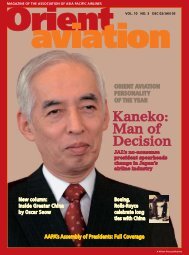
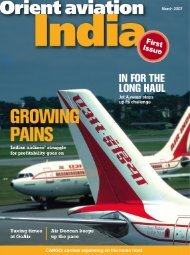
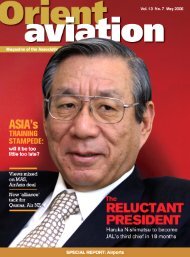
![OAMag-V7N4-Cover [Converted] - Orient Aviation](https://img.yumpu.com/48598575/1/190x255/oamag-v7n4-cover-converted-orient-aviation.jpg?quality=85)
